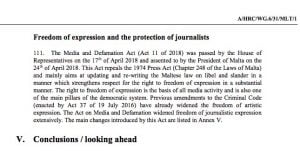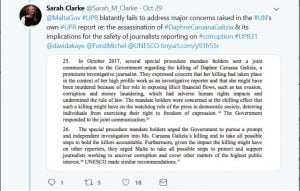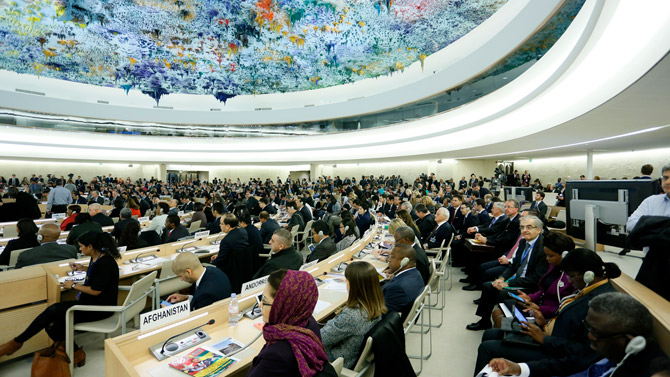The Malta delegation led by Minister for EU Affairs and Equality Helena Dalli today faced a grilling as the UN’s highest human rights body – the Human Rights Council (HRC) – reviewed the country’s track record on human rights.
Dalli presented the national report which, in its section on the protection of journalists, omitted the case of assassinated journalist Daphne Caruana Galizia – yet it was the main point raised in the feedback given by individual countries. The Minister started her address with an update on the case, saying Malta is “relentlessly” pursuing all leads to establish who commissioned her murder. She made no mention of the government’s refusal to pursue a public inquiry.
The Minister started her address with an update on the case, saying Malta is “relentlessly” pursuing all leads to establish who commissioned her murder. She made no mention of the government’s refusal to pursue a public inquiry.
Malta is one of 13 countries being reviewed over two weeks in a process called Universal Periodic Review (UPR). Every four and a half years, the 193 UN Member States undergo interactive review of the human rights situation in their countries on rotational basis. The goal is to improve human rights situation for people around the globe.
Switzerland was among a list of countries harshly critical of Malta’s track record on press freedom: “There are serious doubts as to credibility of the investigation by the Maltese government into her killing.”
It was among several countries recommending that Malta takes “all the necessary steps and conducts a fully transparent investigation into the murder of Daphne Caruana Galizia to ensure justice is done”.
Austria asked, “What steps have been taken to protect journalists from violence?”
Belgium said, “ We are concerned by the deterioration of the freedom of the press”.
“We are deeply concerned by the deterioration of freedom of expression in Malta,” was Denmark’s feedback, with Finland expressing the same concern.
The Netherlands expressed the same concern, with Iceland and other countries adding that Malta should “take all measures to ensure protection of those investigating corruption, after Caruana Galizia’s death”.

PEN International’s advocacy and policy manager commenting on Malta’s presentation.
Recommendations to Malta included “ensuring thorough, prompt, impartial, independent investigations into the assassination of journalists,” measures against SLAPP which the government refused to implement, as well as measures to combat corruption and impunity.
Malta was commended for progress in the area of LGBTIQ rights and for the introduction of the new media law, although concern on press freedom was one of the main concerns.
There are serious doubts as to credibility of the investigation by the Maltese government into her killing
The country was also congratulated for implementing the Istanbul Convention on preventing and combating violence against women and domestic violence, but the HRC noted discrepancies between the law and its enforcement. Malta was heavily criticised for failures to address domestic violence – the situation on the ground showed high numbers yet low prosecution, poor enforcement and failings in the legal process.
Migration was also a main topic of concern, with the government being told to stop criminalising those who save lives at sea. The Platform Human Rights Organisations Malta in its report said human rights experts were not being consulted on policies related to their work, referring to a “particularly difficult if not hostile” relationship with the Home Affairs Ministry.
Human rights NGOs reported an increase in expressions of hatred towards their activities and their members. They said hate speech and hate crimes continued to be “concerning priorities that need to be addressed adequately on both a legal and cultural level”.
They raised concern on “the weakening of democracy” resulting from from bad governance that may dangerously lower the standards and accessibility of rights, generate more poverty and create public distrust in the institutions responsible for protecting rights.
Another 13 countries are being reviewed by the HRC in this round. Each country being reviewed over the two-week period presents its report on the human rights situation in the country and the progress made since the last review. The delegation then receives feedback and recommendations from different countries, and the government has the responsibility to implement the recommendations contained in the final report.













